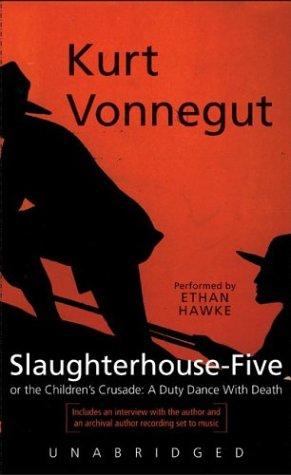Visionario
4 stars
Da avvicinare alla Trilogia della Città di K. Incomprensibile per gli umani.

Audio cassette
English language
Published Nov. 4, 2003 by Caedmon.
Slaughterhouse-Five, also known as The Children's Crusade: A Duty-Dance with Death is a science fiction infused anti-war novel by Kurt Vonnegut, first published in 1969. It follows the life and experiences of Billy Pilgrim, from his early years to his time as an American soldier and chaplain's assistant during World War II, to the post-war years, with Billy occasionally traveling through time. The text centers on Billy's capture by the German Army and his survival of the Allied firebombing of Dresden as a prisoner of war, an experience which Vonnegut himself lived through as an American serviceman. The work has been called an example of "unmatched moral clarity" and "one of the most enduring antiwar novels of all time".
Da avvicinare alla Trilogia della Città di K. Incomprensibile per gli umani.
I liked how Vonnegut manages to tell a poignant war story in a gentle way, without any attempt to glorify anything or anyone. I guess this became a classic because it makes people reflect on their values and their approach to life. And maybe even prompt them to question their own views. To do the above through a novel in a gentle way is the accomplishment of this book.
This is my first Vonnegut novel. When I was reading it, I was surprised how much Douglas Adams' (Hitchhiker's Guide to the Galaxy) style was influenced by Vonnegut.
I don't think that Vonnegut writes poorly, nor do I think this work lacks inherent interest. It's more-so that this, alongside Catch-22 and the like, is a genre I just can't get behind. I understand the need for anti-war fiction, indeed even fiction mostly accounted from real life witness. With that being said, it seems that once you've read one 'war is futile and nothing makes sense, but that's what war is all about' book, you've read them all.
Am I so far out of touch with those in the story that I just don't get it? Well, actually no, and I don't think that this would be Vonnegut's aim either. I hope that war has been made so redundant to me that the thought of going through something like this in life continues to be a totally alien concept to me and everyone else. But I'd also hope that …
I don't think that Vonnegut writes poorly, nor do I think this work lacks inherent interest. It's more-so that this, alongside Catch-22 and the like, is a genre I just can't get behind. I understand the need for anti-war fiction, indeed even fiction mostly accounted from real life witness. With that being said, it seems that once you've read one 'war is futile and nothing makes sense, but that's what war is all about' book, you've read them all.
Am I so far out of touch with those in the story that I just don't get it? Well, actually no, and I don't think that this would be Vonnegut's aim either. I hope that war has been made so redundant to me that the thought of going through something like this in life continues to be a totally alien concept to me and everyone else. But I'd also hope that books of this manner would still resonate and serve as a reminder of those that did go through such events and a warning for the rest of us not to repeat such dark times. This didn't happen here with me, nor have any other stories I've read in this genre. Works like The Gulag Archipelago on the other hand - that's a tour de force to contend with.
There were some phrases in the book, some descriptions that I really did like. An overweight man sits down on a bed. Rather than stating that the springs creaked or some-such, Vonnegut writes 'the mattress springs had a lot to say about that'. Great! Witty! Funny! But overall I cannot recommend it.